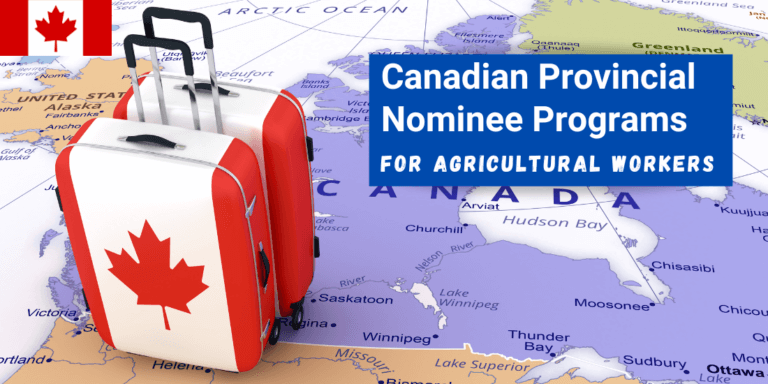The Canadian Provincial Nominee Programs (PNP) is a strategic pathway by the Canadian government to address labor market shortages, especially in agriculture, which is a critical sector for the country’s economy.
Canada has a growing need for skilled workers in farming, livestock management, and other agricultural fields, and the Canadian provincial nominee programs (PNP) offers an opportunity for agricultural workers to secure permanent residency in Canada while contributing to its economic growth and living in a country with one of the best living and working conditions in the world.
This guide will give you in-depth details on how you can migrate to Canada as an agricultural worker using the PNP, eligibility criteria, application steps, as well as the benefits of the program. You can check out Best Country for Nursing Jobs for Immigrants: UK, Switzerland, or Germany?
Table of Contents
ToggleUnderstanding the Canadian Provincial Nominee Programs (PNP)
The Canadian Provincial Nominee Programs (PNP) enables provinces and territories in Canada to nominate individuals for permanent residence based on their respective local labor market needs.
Each province has unique streams designed to attract foreign or immigrant workers with skills that match their regional priorities. For agricultural workers, specific PNP streams exist to meet the growing demand in the agriculture sector.
How the Canadian Provincial Nominee Programs Work
- Provinces identify industries with labor shortages (in this case, agriculture) and create targeted streams.
- Eligible candidates express interest in these streams.
- Selected candidates are nominated for permanent residence, which they can then apply for through Immigration, Refugees, and Citizenship Canada (IRCC).
Why Agricultural Workers Are in Demand
Agriculture contributes significantly to Canada’s economy, particularly in provinces like Saskatchewan, Manitoba, and Alberta, where farming and livestock management are central industries.
A significant portion of Canada’s agricultural workforce is nearing retirement. According to the Canadian Agricultural Human Resource Council, nearly 37% of farm operators are aged 55 or older.
This demographic shift has created a labor gap and an urgent need to fill roles in farming, livestock management, and agricultural innovation with immigrants willing to relocate and work in Canada.
Key Roles in Demand
As an agricultural worker in Canada, there are many roles available, as follows:
- Farm operators
- Livestock managers
- Agricultural equipment operators
- Crop production specialists
To sustain food production and meet export demands, provinces actively seek foreign workers with relevant skills and experience.
Top Canadian Provincial Nominee Programs for Agricultural Workers
1. Saskatchewan Immigrant Nominee Program (SINP)
Saskatchewan has a robust agricultural sector and offers pathways for skilled workers to fill labor shortages in farming and ranching.
Key Streams for Agricultural Workers:
- Occupations In-Demand: Targets skilled workers without a job offer but with experience in high-demand agricultural occupations.
- International Skilled Worker: Requires a valid job offer in Saskatchewan.
Eligibility Criteria:
- Relevant experience in agriculture.
- Language proficiency (CLB 4 or higher).
- Educational credentials equivalent to Canadian standards.
Application Process:
- Submit an Expression of Interest (EOI) through SINP’s portal.
- Await invitation to apply for provincial nomination.
2. Manitoba Provincial Nominee Program (MPNP)
Manitoba’s fertile land supports a thriving agricultural industry. The Skilled Worker Overseas Stream is ideal for agricultural workers.
Eligibility Criteria:
- Intention to live and work in Manitoba.
- Work experience in relevant agricultural roles.
- Meeting education and language benchmarks.
How to Apply:
- Submit an EOI through MPNP’s system.
- Upon nomination, apply for permanent residence via IRCC.
3. British Columbia Provincial Nominee Program (BC PNP)
British Columbia’s agriculture includes horticulture, crop production, and general farm work. The Skills Immigration Stream addresses labor needs in these areas.
Eligibility Criteria:
- A valid job offer in agriculture.
- Experience in relevant agricultural occupations.
- Basic language proficiency.
Application Steps:
- Register in the Skills Immigration Registration System (SIRS).
- Receive an invitation to apply.
4. Alberta Immigrant Nominee Program (AINP)
Alberta’s Self-Employed Farmer Stream and Employer-Driven Stream cater to individuals with expertise in farming and agricultural operations.
Eligibility Criteria:
- Work experience in agriculture.
- Financial resources to buy or start a farm in Alberta (for the Self-Employed Farmer Stream).
- Job offer from an Alberta employer (for the Employer-Driven Stream).
How to Apply:
- Submit an EOI specific to the stream.
- Receive a nomination and proceed with your PR application.
5. Ontario Immigrant Nominee Program (OINP)
Ontario’s agricultural sector relies on foreign workers for greenhouse farming, crop production, and other critical roles. The Employer Job Offer Stream facilitates immigration for agricultural workers.
Eligibility Requirements:
- Job offer in Ontario’s agricultural sector.
- Meeting minimum language and financial requirements.
Application Process:
- Apply through the OINP online system.
- Await nomination confirmation and submit a PR application to IRCC.
Salary Expectations for Agricultural Workers in Canada
Agricultural workers in Canada enjoy competitive wages. Below is an overview of average annual salaries in the sector:
| Role | Salary Range (CAD) |
|---|---|
| Farm Manager | $45,000 – $75,000 |
| Agricultural Equipment Operator | $35,000 – $50,000 |
| General Farm Worker | $30,000 – $45,000 |
| Livestock Worker | $35,000 – $55,000 |
Provinces with a higher demand for agricultural workers, like Alberta and Saskatchewan, may offer higher wages.
Steps to Apply for the Canadian Provincial Nominee Programs as an Agricultural Worker
- Secure a Job Offer:
Obtain a valid job offer from a Canadian employer in the agricultural industry. - Submit an Expression of Interest (EOI):
Apply through the respective province’s online system. - Invitation to Apply:
Wait for an invitation if your skills match provincial requirements. - Provincial Nomination:
Submit required documents (job offer, work experience, language results). - Apply for Permanent Residency:
Use your nomination to apply for PR through IRCC.
Common Challenges and Solutions
- Labor Market Impact Assessment (LMIA):
Many provinces require an LMIA to prove no Canadian worker is available for the job.
Solution: Work with an employer familiar with LMIA processes to secure the required documentation. - Navigating Provincial Variances:
Each province has unique requirements.
Solution: Consult immigration experts or official provincial websites to clarify eligibility.
Benefits of Applying Through Canadian Provincial Nominee Programs
- Faster Path to Permanent Residency: Provincial nominations often expedite the immigration process.
- Family Inclusion: Applicants can bring their spouse and dependents.
- Employment Stability: Guaranteed employment in high-demand sectors.
- Permanent Residency Perks: Access to healthcare, education, and social benefits.
Settlement Support
Programs in Saskatchewan
Saskatchewan is known for its thriving agricultural sector and provides extensive support for new immigrants:
- Saskatchewan Immigrant Settlement Program (SISP): Offers free resources such as language training, job placement assistance, and cultural orientation sessions.
- Regional Settlement Services: Available in rural areas to help immigrants integrate into smaller farming communities.
Programs in Manitoba
Manitoba also prioritizes the successful integration of newcomers:
- Manitoba Start: Provides employment services, career counseling, and connections to local employers in the agricultural sector.
- Settlement Workers in Schools (SWIS): Helps children adjust to the Canadian education system, ensuring a smoother transition for families.
Community Support
In addition to government programs, many local farming communities offer informal support systems. Churches, cultural associations, and volunteer groups often help new immigrants with housing, transportation, and navigating everyday life in Canada.
FAQs For Canadian Provincial Nominee Programs (PNP)
Can I Bring My Family with Me?
Yes, agricultural workers who immigrate to Canada through the Canadian Provincial Nominee Program (PNP) can often bring their immediate family members, including spouses or common-law partners and dependent children.
Once you are nominated by a province and approved for permanent residency by Immigration, Refugees and Citizenship Canada (IRCC), your family members are included in your application and will receive permanent resident status as well.
This is a significant benefit as it allows families to settle together, access free public healthcare and education, and enjoy the same rights as Canadian citizens, excluding the right to vote.
Some provinces also offer settlement programs to help families integrate into their new communities.
What is the Processing Time for PNP Applications?
Processing times for PNP applications vary based on the province and the specific stream you are applying through. On average, the timeline includes:
- Provincial Nomination Stage: 2–6 months, depending on the province.
- Permanent Residency Application: Once you receive a nomination, IRCC processing for permanent residency typically takes 6–18 months.
Expedited processing might be available for certain in-demand occupations, including agricultural workers. It’s important to ensure all documentation, including job offers and language test results, is complete to avoid delays.
Are There Additional Costs Involved in PNP Applications?
In addition to standard application fees for IRCC, provinces may charge a separate application fee for the PNP, which ranges from CAD 250 to CAD 1,500.
Candidates should also budget for other costs, such as language testing (IELTS or CELPIP), medical examinations, and proof of funds requirements.
Conclusion
The Canadian Provincial Nominee Program offers an excellent opportunity for agricultural workers to immigrate to Canada, contributing to a critical industry while enjoying the benefits of permanent residency.
By understanding the specific requirements of each province, securing a job offer, and preparing your application diligently, you can make your Canadian dream a reality.
Start researching your preferred province’s PNP today, and take the first step toward a rewarding future in Canada’s agricultural sector.







